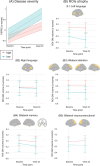Language impairment is associated with faster progression in progressive supranuclear palsy-Richardson syndrome
- PMID: 40684253
- PMCID: PMC12276069
- DOI: 10.1002/alz.70485
Language impairment is associated with faster progression in progressive supranuclear palsy-Richardson syndrome
Abstract
Introduction: Cognitive impairment is common but often overlooked due to motor symptoms in progressive supranuclear palsy-Richardson syndrome (PSP-RS). This study investigates whether cognitive deficits predict disease progression in PSP-RS.
Methods: A total of 146 PSP-RS from the Tilavonemab trial were evaluated at baseline and over 52 weeks using the PSP-Rating Scale (PSPRS), the Repeatable Battery for the Assessment of Neuropsychological Status (RBANS), and the Unified Parkinson's Disease Rating Scale Part-II (UPDRS-II). Multiple linear regression analyses were performed between the RBANS, UPDRS-II, and the PSPRS change. Clinical scores, gray matter volumes, and neurofilament-light chain (NfL) were compared using analyses of covariance (ANCOVAs) and linear mixed models between language score-groups.
Results: Lower RBANS-language at baseline predicted greater PSPRS worsening over time. The low language-score group showed poorer cognitive performance, elevated NfL, and reduced gray matter volume in language-related areas.
Discussion: Speech/language deficits predict worse prognosis in PSP-RS, emphasizing the value of including language scores in clinical trials.
Highlights: Speech and language deficits predict a worse prognosis in progressive supranuclear palsy-Richardson syndrome (PSP-RS). Lower language scores are associated with worse cognitive performance over time. Lower language scores related to higher neurofilament-light chain (NfL) at baseline. The low language-score group presented greater atrophy in language-related brain areas. Stratifying PSP-RS cases using language scores may improve clinical trials.
Keywords: PSP‐Rating Scale; PSP‐Richardson syndrome; RBANS; cognition; disease progression; gray matter volume; language; neurofilament‐light chain.
© 2025 The Author(s). Alzheimer's & Dementia published by Wiley Periodicals LLC on behalf of Alzheimer's Association.
Conflict of interest statement
The other authors declare no competing interests. Author disclosures are available in the Supporting Information.
Figures

References
-
- Litvan I. Cognitive disturbances in progressive supranuclear palsy. In: Tolosa E, Duvoisin R, Cruz‐Sánchez FF, eds. Progressive Supranuclear Palsy: Diagnosis, Pathology, and Therapy. Springer; 1994:69‐78. - PubMed
-
- Kobylecki C, Jones M, Thompson JC, et al. Cognitive‐behavioural features of progressive supranuclear palsy syndrome overlap with frontotemporal dementia. J Neurol. 2015;262:916‐922. - PubMed
-
- Horta‐Barba A, Pagonabarraga J, Martínez‐Horta S, et al. Cognitive and behavioral profile of progressive supranuclear palsy and its phenotypes. J Neurol. 2021;268:3400‐3408. - PubMed
-
- Grafman J, Litvan I, Gomez C, Chase TN. Frontal lobe function in progressive supranuclear palsy. Arch Neurol. 1990;47:553‐558. - PubMed
MeSH terms
Substances
Grants and funding
- Marion and Gerald Soloway Chair in Brain Injury and Concussion Research
- Parkinson's Foundation
- Vivli, Inc
- UCB
- American Brain Foundation
- Sage Therapeutics
- Alterity
- Genentech
- R21DC019749/NH/NIH HHS/United States
- Lundbeck
- Biogen Inc.
- Alzheimer's Association Clinician Scientist Fellowship
- U01NS100610/NIA/NIH
- 5U01NS112010/807745/NH/NIH HHS/United States
- Cambridge University Press
- 2 P30 AG062429-06/NH/NIH HHS/United States
- Lewy Body Dementia Association
- R01AG085029/NIA/NIH
- U19 AG063911-1/NIA/NIH
- R25NS098999/NH/NIH HHS/United States
- R44AG080861/NIA/NIH
- International Parkinson and Movement Disorders Society
- R00 AG073453/AG/NIA NIH HHS/United States
- Novartis
- Biogen and Biohaven
- MedRhythms, Inc
- EIP-Pharma
- Roche
- K99AG073453/AG/NIA NIH HHS/United States
- R25NS098999/NIA/NIH
- AbbVie
- Ono Pharmaceuticals, Accordant and CVS/Caremark
- 5U01NS112010/807745/NIA/NIH
- 1R21NS114764-01A1/NH/NIH HHS/United States
- Michael J Fox Foundation
- BIA R&D
- K23 NS118045/NH/NIH HHS/United States
- 1R21NS114764-01A1/NIA/NIH
- K23 NS121402/NS/NINDS NIH HHS/United States
- American Academy of Neurology
- Rutgers University Press
- CurePSP
- U19 AG063911-1/NH/NIH HHS/United States
- U01NS100610/NH/NIH HHS/United States
- Holloway Family Fund of The Association for Frontotemporal Degeneration
- Sanofi-Genzyme, SwanBio therapeutics and Encora Therapeutics
LinkOut - more resources
Full Text Sources
Medical
Miscellaneous

